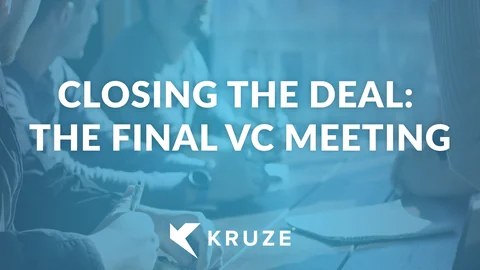
A final meeting with venture capitalists as part of a startup fundraising round can be intimidating. Like the final level in a video game, you’re very close, but it’s not over yet. Founders need to take this step very seriously. Being prepared helps your startup stand out. And these VC meetings can be fun and you can get a lot of great feedback. However, the primary goal is to pass the test and get the money.
Final VC meeting tips
With all that in mind, let’s look at some tips to help you get your funding at your final VC meeting:
- Project quiet confidence. There’s a fine line between confidence and arrogance, and it can be tough to strike the right note. One way to avoid arrogance during your meeting is to try to engage with the investors, rather than simply present to them. Invite their opinions and viewpoints. You always want to appear competent and knowledgeable, but you should also demonstrate humility and a willingness to listen.
- Know your audience. Before your final meeting, you should know your partner sponsor’s role in the VC fund. If your sponsor is a newer partner, you’re going to face more scrutiny during your pitch. So it may be more of an uphill battle, but remember that your sponsor was hired by the managing partners to bring in business, and the managing partners want that person to be successful. In addition, your sponsor is your advocate. Your sponsor is excited about your company and wants this deal to go through. So that person will help you as much as possible.
- Be polite. This is related to the “willingness to listen” mentioned above. Let the other partners talk without interrupting. This can be hard because the other partners may not have read the investment memo or know your industry. By demonstrating respect for their input, you show them how you will behave in the future, especially in a sales situation. Just as you wouldn’t interrupt a sales prospect, you shouldn’t interrupt a VC partner during a funding meeting.
- Plan for skeptics. Somewhere in that room, there will be someone who invested in a company like yours in the past, and that company failed. That history is going to make that person skeptical, and they will ask a lot of tough questions. Your job will be to explain during your meeting why your company will be different. This situation comes up over and over again. There’s an old saying: No venture capital backed startup idea is wrong, it’s just too early. You must articulate why this time is different.
- Prepare to educate people. While it’s better if people come to your final meeting having read the investment memo and done their homework, some may not have time or understand your market or industry. You need to be ready to explain your market and why your solution is important and compelling.
- Be ready to present your financials. Financial projections are very helpful in a pitch meeting. Investors have different areas of expertise, such as strategy, customer acquisition, or building products. Some of the people you’ll be meeting will be financially oriented, and your financial projections for your startup functions as a map for those investors, articulating what you think you’ll be able to accomplish. You need to demonstrate that you understand your key metrics, like your cash requirements, your burn rate, and the number of months you expect your financing to last.
- Strike a balance between conservative and aggressive. As part of your financial projections, you need to carefully consider your approach. If your projections are too conservative, you run the risk of not being interesting to VC firms. So they need to know they can get a solid return. On the other hand, you can’t be so aggressive that you lose your credibility. Projecting $100 million in revenue in year three is probably not going to happen. Projecting $20 million is more realistic and therefore more appealing to investors.
- Don’t bash your competitors. Relationships are a key component of the VC infrastructure. That means it’s very likely someone in that room has looked at one of your competitors as an investment opportunity, knows the founder or CEO of a competitor, or knows a venture capitalist who invested in a competitor. That person may have talked to competitors to get their perspective and may even parrot your competitor’s talking points to you. Just like in a sales meeting, that’s an opportunity for you to articulate why your solution is different and why they should buy your product. You need to do the same thing in a final VC meeting. Disparaging a competitor can cost you credibility, because investors will wonder what you’re afraid of.
- Anticipate pro-rata equity questions. Pro-rata equity questions are a strong signal that your meeting is going very well. If the people who are about to invest in you are really sold they may surprise you by asking for a larger share of the available equity. This is a great question to have, and the correct answer is, “Let me see what I can do. Let me go back to insiders and previous investors and see if I can figure out a way to get you a little bit more ownership.”
- Stick to your script. This is a key point. Your final VC meeting is a high-pressure situation, and you may be tempted to ad-lib and go off script. Don’t start winging it in the middle of your meeting. Stay centered on your idea, your financial plan, and why it’s so important. You need to demonstrate that you’re focused and organized. A solid VC pitch deck will help; make sure you have the ability and script down to run through it in 15 minutes if you get derailed with many, many questions from the investors.
- Show that you’re ready to go. The most important signal you can send to them is that you are ready and willing to go. Show that you really want to take this company from this funding round all the way to an IPO. Now, a lot of things can happen in between, but you need to demonstrate to them that you are a mature person who is ready to dedicate 10 years of your life to this company. That will give them confidence.
Hopefully these tips will help you walk in, dazzle the partners, and convince them to write that check. Don’t be afraid to practice. Practice with your friends, your seed and angel investors, and your management team. Remember, this is the final level of the video game and you’re almost there.
More tips if you are talking to venture investors about raising capital:
The VC Meeting: Essential guide for startup founders
Venture capital meetings are crucial milestones for startup founders seeking funding. Understanding how to navigate these encounters can make the difference between securing investment and walking away empty-handed. This comprehensive guide will walk you through the intricacies of VC meetings, from preparation to follow-up, ensuring you’re well-equipped to make a lasting impression.
What is a VC meeting?
A VC meeting, short for venture capitalist meeting, is usually a presentation and discussion between startup founders and a venture capitalist, an investor who provides capital to young companies in exchange for equity. These sessions are opportunities for entrepreneurs to pitch their business ideas, showcase their products or services, and demonstrate their potential for growth. For VCs, these meetings are chances to evaluate investment opportunities and assess the viability of startups - although not every early-stage investor takes a meeting because they actually want to invest, some meet to try to understand a particular market or even to learn about a competitor to a company they are actually thinking of investing in!
How to get a meeting with a VC
Securing a meeting with a venture capitalist can be challenging, but there are several strategies to increase your chances:
- Leverage warm introductions from mutual connections - by far the best way to get an intro
- Network extensively within your industry
- Attend startup events and pitch competitions
- Craft a compelling executive summary or pitch deck
- Research and target VCs that align with your startup’s focus - some VCs take pride on responding to cold emails, others ignore them
Getting that first meeting is often the hardest part. If you don’t have connections, cold outreach to founders who have already gotten money from your target VCs is a good idea. Ask to meet with these founders to get advice; many founders do try to help out other founders. If the discussion goes well, ask for an intro to their investors! Remember,VCs make money by investing in promising startups, so getting a good intro from someone they already trust is a great way to go.
Preparing for your VC meeting
Understanding VC expectations
Before diving into preparation, it’s essential to understand what VCs are looking for.VC return expectations typically aim for high-growth potential and scalable business models. Even though the entire fund may target a 3 or 5x their money, each individual company needs to do much, much better to make up for portfolio companies that go under. Familiarize yourself with these expectations to align your pitch accordingly.
Preparing your pitch
Be prepared to deliver your pitch in half the allocated time. This concise approach allows for plenty of questions and discussion - which is often where the real value of the meeting lies. You know things are going well if you are getting a lot of questions, although the investor may also be judging your ability to manage the conversation, so pay attention. Additionally, have appendix slides ready to address questions you anticipate. This preparation demonstrates foresight and thorough knowledge of your business.
Preparing for questions
Anticipate potential questions and prepare thoughtful responses. Common areas of inquiry include:
- Market size and growth potential
- Customer acquisition strategy
- Unit economics
- Scalability of the business model
- Competitive landscape
Types of VC meetings
Initial screening
Often a brief call or meeting to assess basic fit between the startup and VC firm.
Pitch meeting
A formal presentation of your business plan and vision to the VC partners.
Due diligence meeting
In-depth discussions and analysis of your business model, financials, and market potential.
Partner meeting
A final presentation to the entire VC partnership before an investment decision is made.
Navigating the VC meeting process
The initial meeting
Your first in-person VC meeting is crucial. Here are some tips:
- Be punctual and professional
- Start with a brief, engaging introduction
- Present your pitch clearly and confidently
- Be prepared to dive into details if asked
- Show enthusiasm for your product and vision
- Listen actively and respond thoughtfully to questions
Follow-up meetings
Subsequent meetings often involve:
- Deeper dives into specific aspects of your business
- Meetings with additional partners or experts
- Addressing concerns or questions raised in previous meetings
- Discussing potential terms of investment
Closing the deal: The final VC meeting
The final meeting with venture capitalists is a critical juncture in your fundraising journey. Here are key strategies to help you succeed:
- Project quiet confidence
- Know your audience and their roles within the VC firm
- Be polite and respectful, allowing partners to speak without interruption
- Prepare for skeptics and tough questions
- Be ready to educate partners on your market and solution
- Present your financials clearly and convincingly
- Strike a balance between conservative and aggressive projections
- Avoid disparaging competitors
- Anticipate and prepare for pro-rata equity questions
- Stick to your script and avoid ad-libbing
- Demonstrate your commitment to long-term success
Post-meeting follow-up
After your VC meeting, follow these steps:
- Send a thank-you email within 24 hours
- Address any open questions or provide requested information promptly
- Keep the VC updated on significant developments or milestones
- Be patient but persistent in following up on next steps
Common VC meeting pitfalls to avoid
- Overconfidence or arrogance
- Lack of preparation or knowledge about your market
- Unrealistic financial projections
- Inability to articulate your unique value proposition
- Neglecting to research the VC firm and partners
The importance of due diligence
Be prepared for rigorous due diligence if your initial meetings go well. We suggest having a Google Drive or Box folder with many of the initial diligence materials ready to go. VCs will typically use aventure capital finance, tax, HR, and due diligence checklist to thoroughly evaluate your startup. Use that list to prepare for diligence ahead of time.
Venture capitalist (VC) meeting
A venture capitalist (VC) meeting is a critical step in the fundraising process for startups. It’s an opportunity for founders to present their business to potential investors and for VCs to evaluate investment opportunities. These meetings typically involve in-depth discussions about the startup’s business model, market potential, financial projections, and team capabilities. Successful VC meetings can lead to funding that accelerates a startup’s growth and brings valuable expertise and connections to the company.
Conclusion: Mastering the art of VC meetings
Successful VC meetings require thorough preparation, clear communication, and strategic follow-up. By understanding the VC meeting process, preparing diligently, and presenting your startup confidently, you significantly increase your chances of securing the funding needed to fuel your growth.
Remember, each VC meeting is an opportunity not just to secure funding, but to build relationships that can provide valuable guidance and support throughout your startup journey. Approach these meetings with professionalism, enthusiasm, and a clear vision for your company’s future, and you’ll be well on your way to success in the competitive world of venture capital.
If you need more information about how to handle that final VC meeting, or any conversations with venture investors, or help with your due diligence, just contact us at Kruze Consulting.















